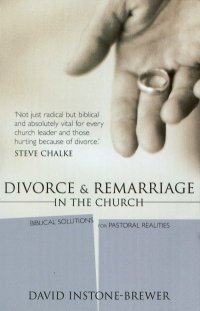

|
Reviews
Divorce and Remarriage | ||

|
W. Eugene March Family Ministry, Summer 2003 |

|
| Full review: | ||
|
In this comprehensive study David Instone-Brewer has made a significant contribution to the study of some of the most pertinent biblical materials dealing with divorce and remar-riage. At the same time, he demonstrates a methodology of study that would he quite helpful in the consideration of many questions that puzzle or disturb contemporary read-ers of the Bible. Divorce and Remarriage in the Bible is not a quick read, but it is informative and instructive. The heart of the study is located in Chapters Five-Seven. Chapter Five provides a most important review of Rabbinic Teaching on the topic. The rabbinic discussions of the first century C.E. provide the context in which Jesus and Paul shared their views on divorce and remarriage. A review of the rabbinic materials reveals clearly-agreed upon reasons for divorce based on scriptural texts. And further, it i.s also clear lhat remarriage was permitted for such "valid" divorces. But there was a substantial debate between two groups of Pharisees, the followers of Rabbi Hillel and Rabbi Shammai, prior to the destruction of Jerusalem in 70 C.E. The disciples of Rabbi Hillel and the courts over which they had jurisdiction, allowed what were called "any matter" di-vorces. In these cases, no cause was required proven in order for a divorce to he granted. These "any matter" di-vorces were much like contemporary "no fault" divorces. Rabbi Shammai and his school interpreted the text on which "any matter" divorces were based (Deuteronomy 24:1) more narrowly as indicating that adultery was the issue. Eventu-ally, after the destruction of Jerusalem, the Shammaites ceased to have any power and thus their interpretation fell out of the discussion. With this basic insight well-demonstrated and docu-mented Instone-Brewer turns to the teaching of Jesus (Chap-ter Six) and Paul (Chapter Seven). The church lost the Jewish context of the discussion in the years following the destruction of Jerusalem and the expansion of the church into ihe Gentile world. What appears to be a clear-cut an-nouncement on the part of Jesus that there is no justifica-tion for divorce (Mark 10), except for adultery (Matthew 19), proves unlikely. More likely in the social context of Jesus' day was that he was making a negative judgment on the "any matter" divorces granted by the Hillelites and thereby siding with the Shammaites. If this is true, Jesus then believed that the "any matter" divorces were invalid and thus remarriage became an occasion for adultery. Paul following Jesus, according to Instone Brewer, used the same basic line of interpretation. In each case, however, Jesus and Paul were addressing particular situations faced by their immediate audiences They assumed that their audience knew the agreed upon teaching and thus left such things unspoken. Jesus, particu-larly, was criticizing one debated view of his contemporar-ies, and should be so heard. Unfortunately, the teaching of Jesus and Paul on the matter of divorce and remarriage were taken out of their original context with negative con-sequences for proper understanding. In this brief review the complexity and clarity of the arguments presented by Instone-Brewer cannot by ad-equately presented. If indeed he is correct in his reading of the social and literary contexts of Jesus and Paul, then centuries of teaching on the matter of divorce and remar-riage in the church need critical review. Some crucial as-pects of the claimed biblical basis for much church doctrine and practice are probably wrong. Instone-Brewer calls for a reexamination of the biblical witness, and offers practical pastoral advice on some of the ways divorce and remarriage should be approached in light of these new insights. Parallel in importance, at least in this reviewer's opin-ion, is the contribution Instone-Brewer makes in terms of methodology. He demonstrates by his careful examination of rabbinic teaching just how crucial it is to read ancient documents with as full an understanding of the social con-text as possible. He offers specific guidelines for how this should be done. The bottom line is that modern interpreters must first seek with all diligence to determine how ordi-nary persons in the culture in which a text was first written understood it. This may seem obvious, but the necessary effort to gain such information is all too often lacking. This volume is "thick," Some of the discussion is a little tedious. The footnotes are copious. But the issues considered are important and deserve the careful attention given. There arc helpful indices (a rarity these days!) and an expansive bibliography. If a thoughtful reexamination of the biblical teachings on divorce and remarriage is sought, this offering by David Instone-Brewer is well worth studying. W. Eugene March, Louisville Presbyterian Theological Seminary, Louisville, KY
|
||
| Read more reviews... | ||
Version
-for ministers
-for academics
-for everyone
Summary
Questions/
Comments
& Replies